Season 5: Episode #146
Podcast with Shakeeb Akhter, Senior Vice President and Chief Digital and Information Officer (CDIO), Children’s Hospital of Philadelphia
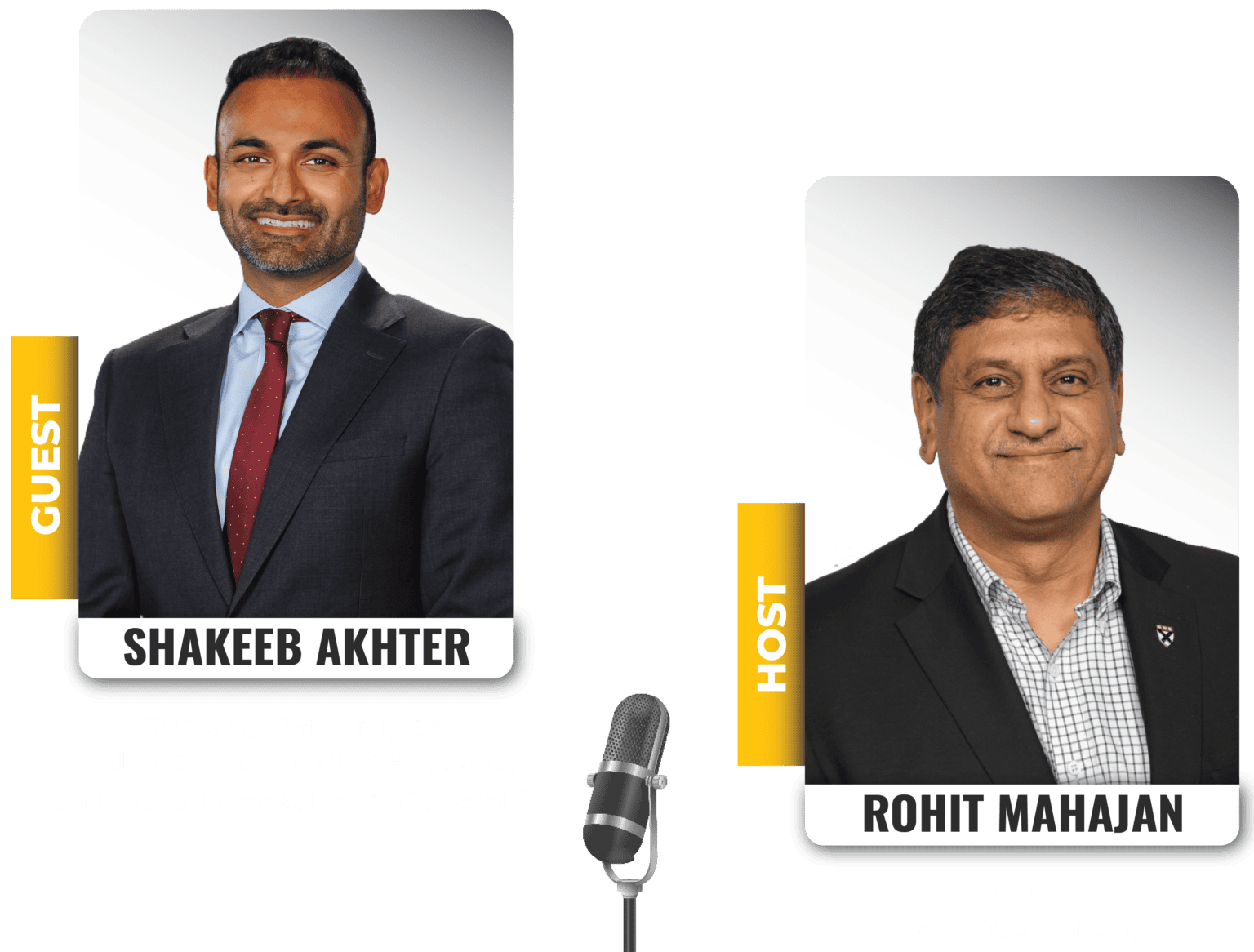
Share
In this episode, Shakeeb Akhter, Senior Vice President and Chief Digital and Information Officer (CDIO) at the Children’s Hospital of Philadelphia (CHOP), discusses his healthcare journey focused on digital transformation, infrastructure, applications, cybersecurity, AI, and data analytics. He highlights CHOP’s three major focus areas that are providing excellent patient care, conducting innovative research, and delivering quality education.
Shakeeb outlines CHOP’s digital transformation strategy, which includes leveraging AI and automation to ease clinician workloads, enhance patient and provider experiences, and develop digitally enabled care models. He explains how CHOP’s digital initiatives are integrated into its broader mission and culture, striving to improve patient outcomes and operational efficiency. He also delves into the hospital’s comprehensive data analytics strategy, built around an enterprise data hub that centralizes and standardizes data from over 100 sources, encompassing both structured and unstructured data.
Additionally, Shakeeb discusses CHOP’s approach to AI, including the development of CHOP GPT, the potential of precision medicine, and collaboration with Epic to implement augmented response technology. He emphasizes the importance of innovation within large systems and CHOP’s ongoing collaboration with startups to drive advancements in healthcare technology. Take a listen!
Show Notes |
||||
| 01:14 | What interests you in the healthcare industry segment to become the CIO of a hospital system? | |||
| 02:47 | How long have you been in the leadership position at UMC, where is it located, and what kind of population does it serve? | |||
| 03:35 | You have done a lot of work from technology perspective to support the business needs of the hospital. You've done over 200 applications and transformed the EMR system. Would you like to share with the audience the thought process that drove those changes and what were some of those changes? | |||
| 07:47 | What do you think about your digital transformation efforts? If you could describe a few of them which have had impact on the patient population. | |||
| 08:30 | Please describe in your own, you know, way that what is digital transformation for provider systems such as yours? Where do you see it going? Some of the challenges that you might have faced and how did it actually end up impacting patients? | |||
| 11:24 | How did you manage to change the mindset of the people? How did they manage to change themselves? To adapt to this new world where technology, especially with AI and GenAI and other new technologies which are coming our way, how do you change mindsets and change behaviors and change culture over there? | |||
| 13:00 | Would you like to provide one example of how the technologies which you were implementing, and you continue to be implementing in your hospital system are accessible and usable by a variety of users, including within the hospital and outside the hospital. | |||
| 16:28 | How do you innovate? Do you involve external parties? Do you have some kind of a, you know, innovation focus department? Or is it part and parcel of everybody's, you know, kind of like daily life? | |||
| 19:24 | What are your thoughts on new technologies, especially Gen AI? Have you been experimenting with any predictive analytics or large language models? What would be your advice or thoughts to any other healthcare leaders on how to go about this journey of exploration? | |||
| 22:15 | Standing here now and looking back, if you were able to go back and change one or two things, what would you like to do differently or have done differently? | |||
Video Podcast and Extracts
About our guest
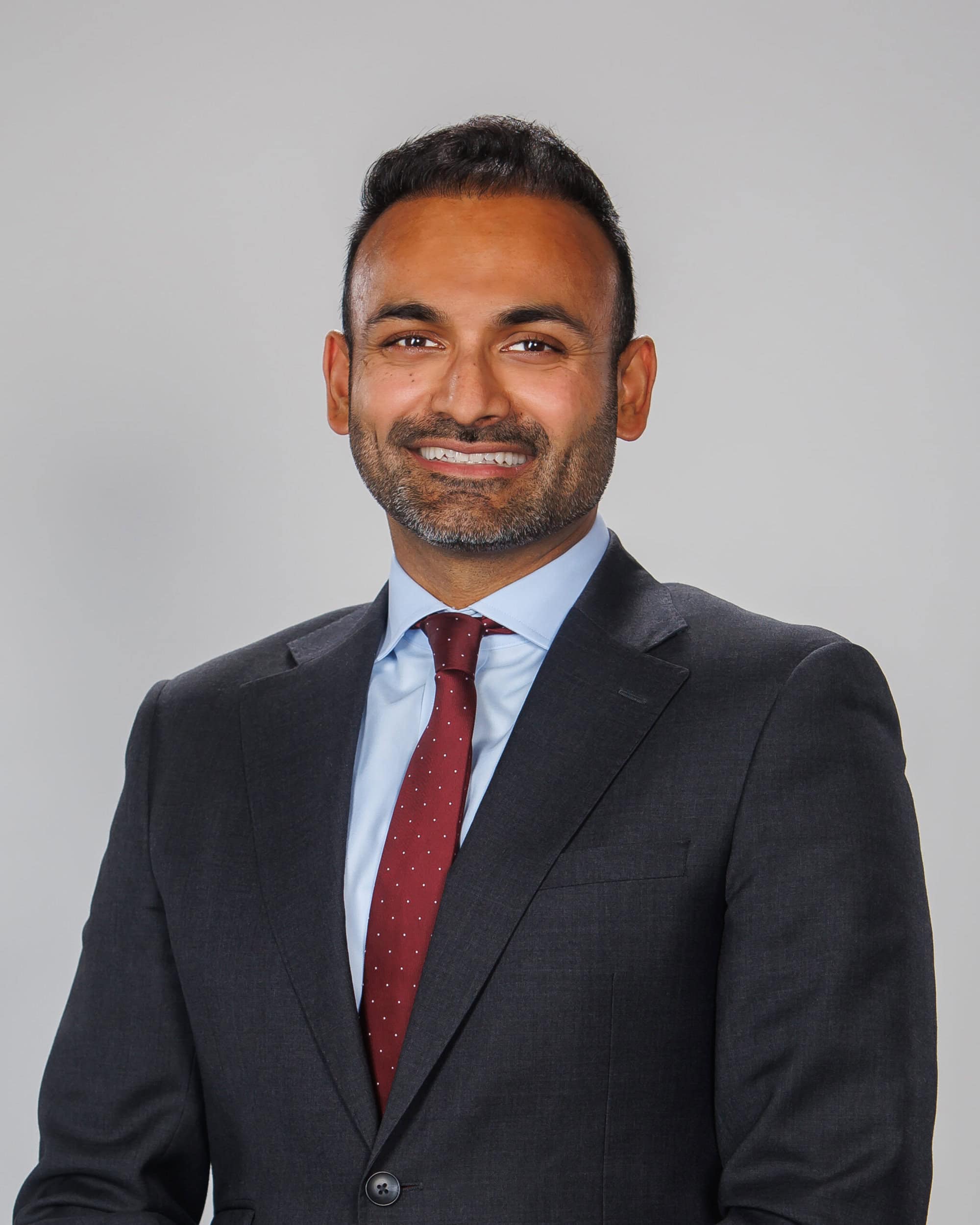
Shakeeb Akhter is a visionary leader in healthcare technology, serving as the Senior Vice President and Chief Digital & Information Officer at Children's Hospital of Philadelphia (CHOP). At CHOP, he oversees all aspects of digital and technology services. With over 20 years of cross-industry experience, Shakeeb leverages his deep understanding of healthcare, technology, analytics and artificial intelligence to drive digital innovation. His passion for innovation and transformation is focused on enhancing patient care, boosting the operational performance of health systems, and elevating the experience for both patients and clinicians.
A certified healthcare CIO (CHCIO) and certified digital healthcare executive (CDH-E), Shakeeb's contributions to the industry have earned him significant recognitions, including being named a 40 Under 40 honoree by the Philadelphia Business Journal, an ORBIE award winner, and the 2023 Philadelphia CIO of the Year. As a thought leader in digital transformation and data strategy, Shakeeb frequently shares his insights at premier conferences such as Gartner, CHIME, HIMSS, and Beckers Healthcare. He is also passionate about teaching and developing the next generation of healthcare technology leaders, serving on the Board of Visitors at the College of Public Health at Temple University and regularly guest lecturing in the Masters of Predictive Analytics Program at Northwestern University.
Shakeeb holds a Bachelor of Arts in Economics from the University of Illinois at Chicago and is currently pursuing his Executive MBA at The Wharton School at the University of Pennsylvania.
Recent Episodes
Welcome to the Big Unlock Podcast. We are carrying on The Big Unlock podcast, which was started by Paddy Padmanabhan. This is 146th episode and we are very excited to have you as the guest and looking forward to our interaction.
Shakeeb: Thanks, and appreciate you having me on. Glad to be the 146th. My name is Shakeeb Akhter. I’m the Chief Digital and Information Officer at Children’s Hospital of Philadelphia (CHOP), where I oversee digital and technology services, our overall enterprise digital transformation strategy, and all things ranging from infrastructure, applications, cybersecurity, AI, data and analytics. I’ve been in that role for almost three years now, and it’s been wonderful. I’m looking forward to speaking with you about the work we’re doing.
Q. Shakeeb, what motivated you to start off in your healthcare journey?
Shakeeb: That’s a great question. It takes me back about two years. My background is in finance and economics. I’ve had two career stories: about a decade in finance, starting with big four consulting in financial services, then moving into banking, specifically in derivatives quantitative modeling during the 2008 financial crisis. That’s when I really began to understand the intersection of technology, banking, and quantitative modeling.
It was an interesting time, using data, analytics, and technology to drive things forward. During that period, I realized I wanted to do something more meaningful long-term—something aligned with my values. I looked around and found healthcare to be a great place to build a legacy, contribute to humanity, and drive improvement. So, I made a conscious and hard pivot from finance to healthcare technology.
It’s been a rewarding journey, full of change and opportunities to give back. I’ve learned a lot, and I’m really happy with that decision.
Q. That’s great to know, Shakeeb. Would you like to tell us more about what drives you at job from delivering the services that you do and touch on your digital literacy and culture initiatives?
Shakeeb: Sure. Just to give a quick overview of the Children’s Hospital of Philadelphia (CHOP), we have a very special mission: to solve the most complex problems and give every child hope for a healthy future. CHOP was actually the first paediatric hospital in the U.S.
Yeah, many people don’t. We focus on three major areas: providing excellent patient care, driving innovative research, and offering quality education to advance the field. That’s what drives us.
In terms of scale, we have three hospital locations, one of which is dedicated exclusively to behavioral health. While we’re based in Philadelphia, we have over 50 care network sites, including urgent care, primary care, and specialty care. We see around 1.5 million outpatient visits and 30,000 to 35,000 admissions annually. Although we’re located in Philadelphia, we have a global footprint, serving children from all 50 states and over 65 countries.
We have about 28,000 employees, including 2,000 credentialed physicians and dentists, and around 700 beds. We also have a large research institute focused to drive research based breakthroughs in pediatric care. Our clinical operations, research, and foundation work together to drive transformation in pediatric care.
Q. That’s awesome. I understand you’ve focused on some special initiatives around digital literacy, especially with all the changes we’re seeing, like AI and Gen AI. But things are changing and care needs to be more accessible. You have some good initiatives around training and teaching people about all things digital and also building a digital culture in the organizations. Could you please talk with us about that?
Shakeeb: Sure. To answer that, I’d like to take a step back. When I became CIO almost three years ago, we embarked on a journey to develop a digital transformation strategy. Before that, we had an information services and technology strategy, but we took the time as a team across CHOP to define what digital transformation truly means to us.
What does it actually mean beyond just being a buzzword? For us, it’s a systematic and intentional redesign of everything we do through technology. The key to our digital transformation strategy is that it was developed in partnership with our chief strategy officer, chief medical officer, and one of our chief operations officers, with input from around 200 people across the organization. We asked ourselves: What does digital transformation mean to CHOP? Where should we focus, and how can we create a digital culture here? That’s how the work began a few years ago.
It was really valuable to gather ideas on where to focus and what matters most to CHOP—what leverages our strengths and helps us transform ourselves and the industry. We landed on three focus areas.
First is AI and automation. No meeting is complete without mentioning AI, right? So, what does AI and automation mean for us? How can we use it to make our work easier, give time back to clinicians, improve efficiency, and drive innovation in both care and research?
Second is the total experience—improving patient, provider, employee, and partner experiences. This includes our digital door strategy, where we’re focused on improving access, creating a seamless experience for patients to access care at CHOP, and reducing time to care. For providers, we’re tackling burnout, especially with documentation and EMR. How can we use technology to ease that burden, reduce workload, and improve satisfaction?
The third piece is digitally enabled care models. How can we design care models that use digital tools to help us meet patients where they are? We’ve launched several remote patient management programs to discharge children earlier and provide care at home without sacrificing quality.
These are just some of our initiatives. Our strategy’s success is rooted in integrating digital into everything we already stand for—high quality, the best patient outcomes, excellent patient experiences, and driving research and innovation. That’s our philosophy: digital is woven into our business strategy. It’s not something separate; it’s about being digital, not just doing digital. That’s how we frame it.
Q. That’s a really interesting positioning, Shakeeb. I’m sure that your background in data and analytics has helped really propel it forward.
Shakeeb: I’m a big proponent of data analytics—it’s been in my DNA for a long time. I believe it’s the cornerstone of driving digital transformation. It’s the foundation for understanding our current performance, figuring out how we can improve, and measuring progress moving forward. We use data analytics as much as possible to guide our digital transformation efforts and to measure the outcomes. It’s really important to us.
Q. Can you share some insights from your journey, especially on managing data from disparate systems? How do you prepare it for a 360-degree view of the patient, or any 360-degree view, in a large system like yours with millions of patients and thousands of physicians?
Shakeeb: Yeah, absolutely. From my perspective, our data analytics strategy, which we built five years ago, has six pillars. The first is creating an enterprise data hub—getting all of our data into a single data warehouse or lakehouse. We have over 100 source systems feeding into this, with both structured and unstructured data, allowing us to ingest everything into one repository.
The second step is modeling the data appropriately. We integrate, standardize, normalize, deduplicate, and trust the data. Data integration is crucial to our strategy. The next step is ensuring data trust. Without trusted data, it can’t be used for decision-making. We’ve created a data trust office focused on governance, quality, and stewardship, applying these standards at the warehouse level to build a trusted data layer. Our enterprise-grade analytics solutions are based on this layer, eliminating most of the usual questions about data origin and meaning.
About a year ago, we launched our enterprise data catalog—a single front door to all data assets at CHOP. This includes metric definitions, cohorts, and dashboards, making data more accessible.
Next, with trusted and integrated data, we can create a data-literate workforce. We’ve invested heavily in data literacy through our Data Analytics University, which has trained thousands at CHOP. We teach people how to use data, tell stories with it, assess its quality, and make data-driven decisions.
The final two pillars involve deploying self-service analytics solutions. Thanks to our work on literacy, trust, and integration, we’ve seen widespread adoption. Now, we’re focusing on predictive data science and advanced analytics—how to predict outcomes before they happen. That’s the advanced analytics component of our strategy.
Q. All this seems to play into Gen AI as well, right? It’s democratizing access—anyone can use it in plain English. Can you share your thoughts or initiatives around Gen AI?
Shakeeb: Sure. I think Gen AI along with every other type of AI is highly reliant on large data sets that are of high quality. When my team and I talk about it, we said that the real limiting step to deploying AI at scale is data quality. So, we’re highly focused on measuring, monitoring, and improving our data quality.
We’re implementing tools to do that, in addition to the data trust work I talked about. That’s the key. In terms of AI, I remind folks Gen AI is the newest form of AI. We’ve had deep learning, machine learning, natural language processing, and computer vision for decades—studied, tried, and true applications of AI—and they all rely on high-quality data. We’re focused on being inclusive of those other branches of AI and seeing how we’ll apply them.
Gen AI has a ton of potential; it’s the newest and brightest in terms of attention. We’re testing what we’re calling CHOP GPT, our own instance of CHOP GPT. Our vision for AI is AI as an ally to our workforce. We want to position AI to help us work smarter and care better for our patients. That’s our focus for AI.
For Gen AI, we’re developing CHOP GPT and working on other AI uses. For example, we’re training a large language model on our policies and procedures, making them searchable and accessible to staff. On a broader AI scale, we’re using predictive AI to predict claims denials before they spread and to predict other clinical events.
With Gen AI, we’ve partnered with Epic. We’re the first organization to scale augmented response technology (ART) with Epic for all clinicians. This uses LLMs to draft responses to patient messages. Our clinicians get millions of messages a year, and this saves time. We’re also working on use cases with Epic, like note summarization, to reduce the burden for clinicians.
Q. Very cool. So, Shakeeb, moving on to another topic of interest. In large systems, one would imagine it’s difficult to innovate. What’s your approach at CHOP around innovation? And along with that, how do you work with startups? They’re innovating all the time, coming out with new solutions. If you could touch on these two areas, that would be great.
Shakeeb: Sure. From an innovation perspective, innovation is in CHOP’s DNA. It’s been a hallmark of the organization from a clinical and research standpoint for a very long time. We’re trying to bring that same thinking into the technology landscape.
We do this in a couple of ways. One is partnering with our research institute to identify research scientists working on AI, machine learning, and other techniques in healthcare in novel ways. We figure out how to support them in their work.
Second, our starting point for digital innovation is always defining a problem or challenge that’s impactful to CHOP, then working backward to determine the technology solution. We don’t look for technology in search of a problem. We focus on problem statements, outcome metrics, and prioritizing where to spend our time and effort. Our Chief Medical Officer has also launched an Innovation Catalyst Program to identify large, challenging problems. Our Digital Technology Services (DTS) team is embedded in those conversations to determine if there’s a technology solution that can drive innovation in that space.
Regarding partnering with startups, our strategy is to constantly scan the market for new solutions that add value and help solve our pain points. We have a platform play strategy, where we first turn to our large, strategic partners to see if they have an existing solution that meets our needs. If not, we’re open to partnering with others.
Long term, I believe we’ll move in the direction where, when we see a unique solution, we’ll approach startups with key problems we’re trying to solve at CHOP and open that up to other startups in the market. If they’re working in this space and meet our requirements, we’d love to hear from them. As we work on the Center for Digital Innovation, this is part of our vision for the future. We’d love to co-develop products with others and potentially share in their success. That’s what we’re thinking about for how we’ll partner with the startup ecosystem.
Q. So, Shakeeb, I would like to wrap up the session with your thoughts or insights on what’s coming next. The professor at Wharton I used to work with, Professor Jerry, would say, “the next big thing.” What do you think is the next big thing or the next big innovation?
Shakeeb: I think the next big thing is really bringing all the disparate data sets in healthcare together to analyze and predict preventatively which patients are at risk for specific diseases. This concept of precision medicine is on the cusp of becoming a reality, thanks to advancements in technology, the availability of data sets, and interoperability standards led by the industry.
I believe this is the moment when precision medicine will be a reality for us in the next few years, allowing us to offer more tailored care to our patients. This brings together many elements we discussed: data, analytics, and AI, along with clinical decision support and informatics. These will be essential to integrate these ideas into workflows and identify patients at risk for particular diseases.
We’ll use genomic data and other forms of data that patients may not even be aware of, helping them improve their outcomes through this process. So, I think that’s the next big thing in healthcare, and we’re at the right time for this tipping point.
We hope you enjoyed this podcast. Subscribe to our podcast series at www.thebigunlock.com and write to us at [email protected]
Disclaimer: This Q&A has been derived from the podcast transcript and has been edited for readability and clarity.
About the host
Paddy is the co-author of Healthcare Digital Transformation – How Consumerism, Technology and Pandemic are Accelerating the Future (Taylor & Francis, Aug 2020), along with Edward W. Marx. Paddy is also the author of the best-selling book The Big Unlock – Harnessing Data and Growing Digital Health Businesses in a Value-based Care Era (Archway Publishing, 2017). He is the host of the highly subscribed The Big Unlock podcast on digital transformation in healthcare featuring C-level executives from the healthcare and technology sectors. He is widely published and has a by-lined column in CIO Magazine and other respected industry publications.
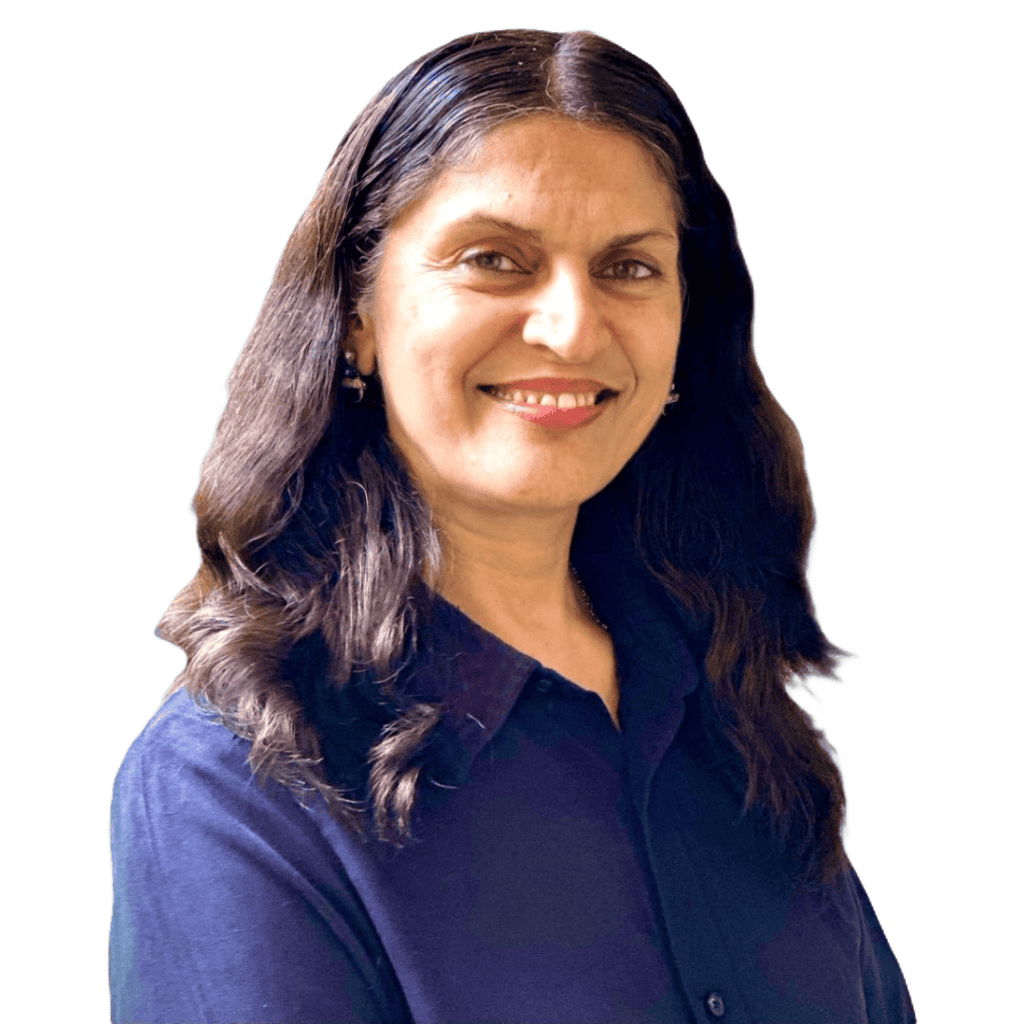
Ritu M. Uberoy has over twenty-five years of experience in the software and information technology industry in the United States and in India. She established Saviance Technologies in India and has been involved in the delivery of several successful software projects and products to clients in various industry segments.
Ritu completed AI for Health Care: Concepts and Applications from the Harvard T.H. Chan School of Public Health and Applied Generative AI for Digital Transformation from MIT Professional Education. She has successfully taught Gen AI concepts in a classroom setting in Houston and in workshop settings to C-Suite leaders in Boston and Cleveland. She attended HIMSS in March 2024 at Orlando and the Imagination in Action AI Summit at MIT in April 2024. She is also responsible for the GenAI Center of Excellence at BigRio and DigiMTM Digital Maturity Model and Assessment at Damo.
Ritu earned her Bachelor’s degree in Computer Science from Delhi Institute of Technology (now NSIT) and a Master’s degree in Computer Science from Santa Clara University in California. She has participated in the Fellow’s program at The Wharton School, University of Pennsylvania.
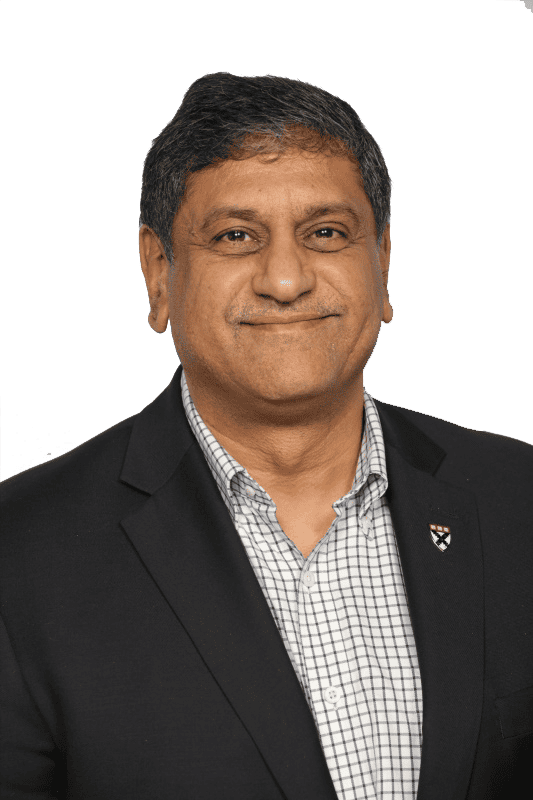
Rohit Mahajan is an entrepreneur and a leader in the information technology and software industry. His focus lies in the field of artificial intelligence and digital transformation. He has also written a book on Quantum Care, A Deep Dive into AI for Health Delivery and Research that has been published and has been trending #1 in several categories on Amazon.
Rohit is skilled in business and IT strategy, M&A, Sales & Marketing and Global Delivery. He holds a bachelor’s degree in Electronics and Communications Engineering, is a Wharton School Fellow and a graduate from the Harvard Business School.
Rohit is the CEO of Damo, Managing Partner and CEO of BigRio, the President at Citadel Discovery, Advisor at CarTwin, Managing Partner at C2R Tech, and Founder at BetterLungs. He has previously also worked with IBM and Wipro. He completed his executive education programs in AI in Business and Healthcare from MIT Sloan, MIT CSAIL and Harvard School of Public Health. He has completed the Global Healthcare Leaders Program from Harvard Medical School.
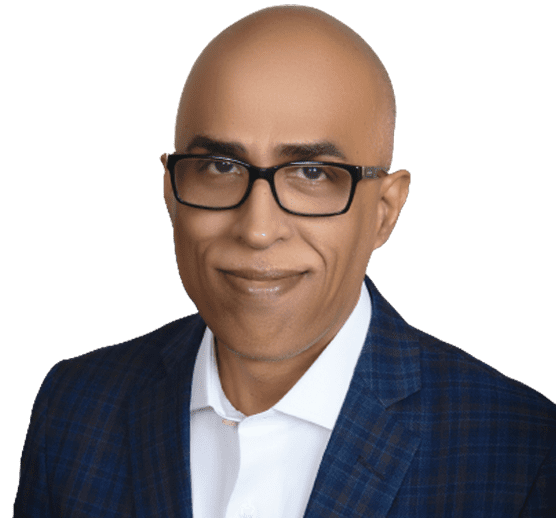
Paddy was the co-author of Healthcare Digital Transformation – How Consumerism, Technology and Pandemic are Accelerating the Future (Taylor & Francis, Aug 2020), along with Edward W. Marx. Paddy was also the author of the best-selling book The Big Unlock – Harnessing Data and Growing Digital Health Businesses in a Value-based Care Era (Archway Publishing, 2017). He was the host of the highly subscribed The Big Unlock podcast on digital transformation in healthcare featuring C-level executives from the healthcare and technology sectors. He was widely published and had a by-lined column in CIO Magazine and other respected industry publications.
Stay informed on the latest in digital health innovation and digital transformation